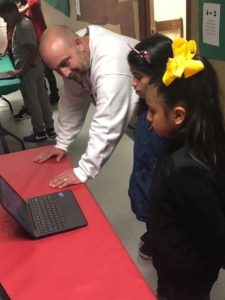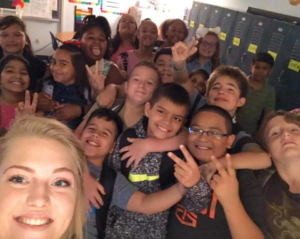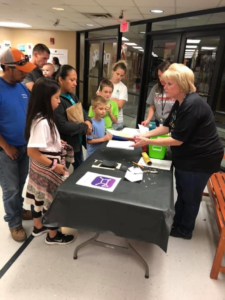By Sharon Kebschull Barrett, May 13, 2020
Part 1 of 3
“I’m not in this for the money,” teachers routinely say. And yet, money and the respect of being decently paid matters—witness teacher protests across the country in recent years. So why would a teacher drive (pre-COVID-19) through a wealthier, better-paying district to head for one that pays less and serves a higher-need student population?

One Texas district can answer that with two words: Opportunity Culture®.
In Mineral Wells Independent School District, David Wells faced grim numbers in his first years as principal of Travis Elementary.
“I was here one and a half years before becoming principal, and I was one of 26 new hires out of 85 or 90 total. We were crushing the state average on turnover—which is not a good thing—and that was a typical year,” Wells said. “But after our first year of Opportunity Culture®, we dropped to just needing to hire eight people, and the next year, six.”
Sara Morgan is one reason those numbers fell.
“I had just gotten out of student teaching before coming here,” Morgan said. “I live in [higher-paying] Weatherford, and about the same distance from Fort Worth, which is even higher-paying. When I had my interview with David, he talked about how this would help new teachers excel and not struggle so much, and of course that’s something I worried about.”
Opportunity Culture® “definitely did what he said,” Morgan said. “It made my first year go by so much smoother than I anticipated. Looking back, I don’t think I felt like I was drowning, like they said in college you might feel.”
Lindsey Wells, Morgan’s multi-classroom leader (MCL), who is also David Wells’ wife, provided the precise support Morgan needed.
“We did co-teaching, or parallel groupings, so we taught the exact same lesson but split the group to have smaller groups,” Lindsey Wells said. “She hasn’t needed content support as much as working with data and working with her students. I have eight teachers all at different levels, all needing something different—just like classroom kids have different levels and needs—so I can do that for all my teachers.”

Nearly three years later, Morgan is gladly sticking around, despite the higher-paying districts nearby. “My full intention is to be here as long as I can,” she said. “I do feel supported, and the whole fifth-grade team feels like a family, so it would hurt me more to leave. With having an MCL and Opportunity Culture®, I just don’t think I would have the same community that I have here.”
That greater sense of community is a common refrain among Opportunity Culture® educators, born of the collaborative MCL teaching teams that are the foundation of an Opportunity Culture®. One key, they note, is the balance of high expectations for teachers to achieve strong student learning with the genuine and non-evaluative support from MCLs (and, for MCLs, support they provide to one another and principals as their school’s instructional team of leaders).
“Teachers don’t leave, because of the support they’re able to get,” David Wells said. “It helped us with recruitment and retention equally. If you’re going to turn around a campus, you better start there. If you fix that, you fix a lot of things.”
Wells notes that Opportunity Culture® (OC) schools become a selling point for teachers’ children as well, because if they put their children in the district, “I can promise you the quality we’re putting in front of students.”
“Those school districts with high poverty rates like ours, at 80 percent—you’re fighting with a short stick,” he said. “So our quality has to be better than those other lower-poverty districts, so teachers see what we’re trying to do, and it helps with buy-in. I want them to know what we stand for and who we are.”

Carla Watson, the sixth-grade MCL for a six-teacher math and ELA team, also drives through another district to get to her job, and said she can’t imagine going anywhere else. Being an MCL is a rewarding challenge, she said.
“I’ve found in this job that you do have to change,” she said. “I can’t do it all myself, and this job has helped me know that [team teachers] can do it, and I need them to do it, and there’s a level of respect between myself and the teachers. I wouldn’t want to do anything else.”
That’s music to David Wells’ ears.
“The impact that OC has given me to be able to recruit is off the charts, and I preach it in every single [job] interview I do,” Wells said. “We are 40 minutes from the Dallas metroplex, and we can’t compete with the amount of money they can put in teachers’ pockets. Fifty to 60 percent of our teachers drive past all of those schools to come teach here. Why? OC gives them the why, because I’m able to bring those teachers in and show them the amount of support they can’t get in districts that that they pass on their way here that pay more and have higher-performing, lower-poverty schools.
“If you want to be a good teacher and make good money, sure, sign on with another school,” he said. “But if you want to be a great teacher and five years down the road say, “I’m phenomenal,’ sign on here, because we can grow you into a great teacher.”
Read Part 2, Choosing Opportunity Culture®
Note: Public Impact® and Opportunity Culture® and Multi-Classroom Leader® are registered trademarks.
